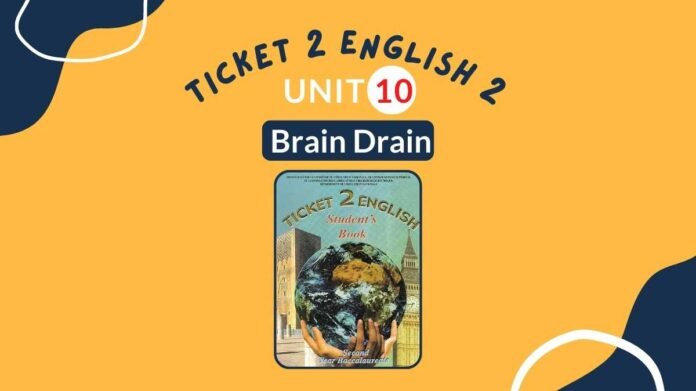This post is a comprehensive overview of “Ticket 2 English Unit 10 Brain Drain,” which includes essential information on vocabulary, functions, grammar, and writing. It aims to enhance your understanding of this topic and assist you in getting good marks in your exams.
- Vocabulary
- Functions: Expressing Regret
- Grammar: Restrictive and Non-Restrictive Clauses
- Writing: Expository Essay
According to Merriam-Webster Dictionary :
Brain Drain is the departure of educated or professional people from one country, economic sector, or field for another, usually for better pay or living conditions
Vocabulary Ticket 2 English Unit 10
Causes of Brain Drain
Push Factors (reasons that are in their countries of origin)
- Unsatisfactory living conditions
- Lack of research and other facilities, including support staff
- Declining quality of the educational system
- Social unrest, political conflicts, and wars
- Discrimination in appointments and promotions
- Lack of satisfactory working conditions
- Low wages and income
Pull Factors (reasons that are in the host countries)
- Higher wages and salaries
- Substantial funds for research, advanced technology, modern facilities
- Political stability
- Better working conditions
- Intellectual freedom
Other Vocabulary Related to Ticket 2 English Unit 10
- Brain drain: The emigration of educated professionals to other countries
- Physician: A person who practices medicine
- Physicist: An expert in physics
- Scholar: An educated person who has gained mastery in one or more disciplines
- Income: Revenue
- Gain: Obtain something needed or wanted
- Underdeveloped: Not yet fully developed
- Skilled: Having the ability to perform a task expertly and well
- Unskilled: Not having a particular skill or training
- Tempting: Highly attractive
Prefixes
- inter: Between, among (intercontinental)
- extra: Outside, beyond (extraterrestrial)
- intra: Within, inside (intracellular)
- under: Less than, insufficient (underpaid)
- over: Excessively, more than (overpopulated)
- super: Above, over, beyond (supersonic)
- hyper: Above, over, excessive (hypersensitive)
Collocations
- Brain drain
- Low pay
- Attract attention
- Developed countries
- High technology
- Skilled workers
- Job opportunities
- Host countries
- Human resources
Functions: Expressing Regret
Regret can be about something in the present or the past.
If it is in the present, then we use the rule of present wish or conditional 2
If it is in the past, then we use the rule of past wish or conditional 3
Present Regret
Present situation
I don’t know how to use a computer.
Regret is present
- I regret not knowing How to use a computer
- If only I knew how to use a computer
- I wish I knew how to use a computer
Past Regret
Past situation
I didn’t know how to use a computer
Regret in past
- I regret not knowing How to use a computer
- If only I had known how to use a computer
- I wish I had known how to use a computer
Grammar: Restrictive and Non-Restrictive Clauses
Restrictive clauses and non-restrictive clauses are two types of clauses that can be used in a sentence.
A restrictive clause
It is a clause that is essential to the meaning of a sentence because it specifies which particular thing or person is being referred to. It is called restrictive because it restricts or defines the noun or pronoun that it modifies. Commas do not set off restrictive clauses.
For example:
“The book that I borrowed from the library is fascinating.” In this sentence, the clause “that I borrowed from the library” is restrictive because it specifies which book is being referred to. With this clause, the sentence would be clear which book is being discussed.
A non-restrictive clause
On the other hand, it is a clause that provides additional information about the noun or pronoun but is not essential to the sentence’s meaning. Commas set off non-restrictive clauses.
For example:
“My friend, who lives in New York, is coming to visit.” In this sentence, the clause “who lives in New York” is non-restrictive because it provides additional information about the friend but is not essential to the sentence’s meaning.
Who = used for persons
Which = preferences
Whose = possession
That = persons, animals, and things
Examples of Restrictive and Non-Restrictive Clauses
- She has a son who is a doctor.
- She lives in a city which she likes a lot.
- That boy, whose jeans are blue, is my friend.
- My friend, who is a doctor, is coming over later.
- The man, whom I met at the conference, is coming to visit.
- I wouldn’t say I like the table that stands in the kitchen.
Writing: Expository Essay
Click on this link to see How to Write an Expository Essay 2023 Guide




hello sir i really appreciate your help thank you so much . Allah Bless you.
but please i didn’t find unit 9 ?
d. had left
Many thanks brother Nabil, a lot of success!
Well done!
Thanks
Thank you very much Mr. Sbaybi for this valuable website.
Thank you very much Mr. Sbaybi for these valuable website.